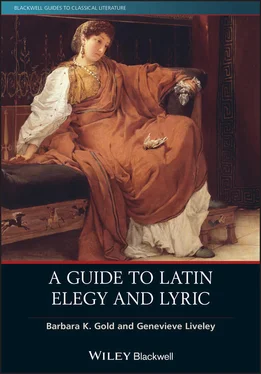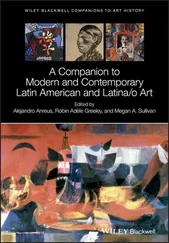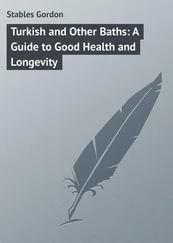Yet this is not to say that Tibullus is disengaged from the contemporary world in his writings, or that the radical political and cultural changes introduced by Augustus leave no mark at all upon his poetry. On the contrary, Tibullus’ efforts to distance himself from the new world order and its politics have a profound influence on the style and tone of his elegiac writing (see Chapter 4). In particular, Tibullus appears to be anxious about his role in this new world; his poetry repeatedly questions what it means to be a Roman citizen – and what it means to be a man. As Efi Spentzou explains (2013: 26): “There is in Tibullus’ poems a puzzling, intriguing quality: a studied air of distance from the political centre and yet a constant and deep-seated preoccupation with Roman duties, manhood and citizenship.” In this respect, Tibullus is profoundly engaged with the sociopolitical world around him and his silence about Augustus actually speaks volumes (see especially Miller 2004).
There are other aspects of the new political regime that clearly influence Tibullus’ elegiac writing. Tibullus opens and closes his first book of elegies with a forthright ideological rejection of war and imperial conquest, criticizing the desire for dominion and wealth that was driving Augustus’ imperial ambitions for Rome at this time. In direct and pointed contrast to such ambitions, Tibullus declares his own desire for peace and for a simple life in the countryside (elegies 1.1 and 1.10). He even invites his readers to see a connection between his own rejection of the status quo and the recent civil wars (just in case we happen to have missed it). He alludes to his poor “inheritance” (1.1.41–2) and the fact that his family have lost some of their ancestral property to the taxes imposed by Julius Caesar as part of the land-confiscations of 41–40 bce, which Caesar had used to dole out army pensions to those men who had been his supporters at the battle of Philippi. Tibullus does not always shy away from making political statements in his poetry, then, despite his withdrawal from the world of warfare and politics, and despite his reputation for softness and dreaminess (see Miller 2004; Spentzou 2013).
The merging of politics and poetry is far more prominent in Propertius, however. Here we see a particularly strong reaction against the bloodshed and violence of Rome’s recent history of civil war, and an anti-war rhetoric and ideology that directly opposes war ( arma ) to love ( amor ). Like Tibullus, Propertius mentions the personal loss of ancestral property to the land-confiscations of the early civil war period (4.1.128–130). More poignantly, he also mentions the personal loss of a close relative named Gallus (not the poet Gallus) at the siege of Perusia in 40 bce – one of the cruelest episodes of the civil war period (1.21 and 1.22). The long winter siege of the town of Perusia (neighboring Propertius’ own hometown, he tells us) was broken by Octavian who, in a characteristic act of violent revenge, executed the town’s leaders, slaughtered its men, and set fire to the town itself. Propertius’ kinsman managed to escape Octavian’s troops, only to be killed by bandits on the surrounding hillside, his bones left unburied, his death ultimately inglorious (see Spentzou 2013: 47–49). Propertius even dares to mention the battle of Actium (another example of Octavian’s bloody civil war victories) and to implicitly criticize the grief and heartbreak that the civil wars brought to Rome. If everyone were to follow his own example and be content to lead a quiet life full of poetry, peace, love, leisure (and plenty of wine), Propertius claims that then (2.15.43–6):
non ferrum crudele neque esset bellica navis,
nec nostra Actiacum verteret ossa mare,
nec totiens propriis circum oppugnata triumphis
lassa foret crinis solvere Roma suos.
(There would be no cruel weapons, no warships,
nor would our bones be rolled in the sea of Actium,
nor would Rome, all too often beaten down with triumphs against herself,
be so tired of tearing out/letting down her hair in grief.)
Specific references to such real historical events and to civil war atrocities in which Octavian was directly involved seem to position Propertius as unambiguously anti-Augustan. Even when Propertius is taken under the wing of a new literary patron, Maecenas (a close personal and political ally of Augustus), the poet remains reluctant to write work that is sympathetic to the princeps or his regime. In the programmatic opening poem of his second book of elegies, in an address to Maecenas, Propertius initially appears to bow to pressure to write poetry which “commemorates your Caesar’s wars and deeds” (2.1.25–6). However, as the poem continues, he offers a damning illustration of the particularly horrific wars and deeds committed by the young Augustus/Octavian (2.1.25–35):
bellaque resque tui memorarem Caesaris, et tu
Caesare sub magno cura secunda fores.
nam quotiens Mutinam aut civilia busta Philippos
aut canerem Siculae classica bella fugae,
eversosque focos antiquae gentis Etruscae,
et Ptolemaeei litora capta Phari,
aut canerem Aegyptum et Nilum, cum attractus in urbem
septem captivis debilis ibat aquis,
aut regum auratis circumdata colla catenis,
Actiaque in Sacra currere rostra Via;
te mea Musa illis semper contexeret armis,
(I would commemorate your Caesar’s wars and deeds, and you
[Maecenas] would be my next concern, second to mighty Caesar
For whenever I sang of Mutina or Philippi, where Roman citizens are buried,
or I sang of naval battles and Sicilian refugees,
or of the ruined hearths of Etruria’s ancient people,
or of the captured beaches of Ptolemaic Pharos,
and if I sang of Egypt and the Nile, when it was dragged into Rome,
flowing weakly with its seven streams captive;
or I sang of the necks of kings encircled with chains of gold,
or the prows of Actian ships sailing along the Sacred Way, then
my Muse would always weave you [Maecenas] into these wars.)
The list of Augustus’ military deeds that Propertius “commemorates” here is effectively a catalog of the many horrors the princeps committed to achieve his ultimate victory in the civil wars; the elegy sardonically “celebrates” Augustus’ brutal triumphs over his fellow Roman citizens. Propertius claims he can’t write of any of these deeds without also implicating Maecenas in the shame and guilt of such atrocities. He could compose an epic celebrating Augustus’ achievements (2.1.41–2), but as a loyal follower of Callimachus he hasn’t the “art” or the heart to write long epic verses about warfare. Nor, he claims, does he have the strength to trace Caesar’s family tree all the way back to his Trojan ancestors just to avoid having to face up to Augustus’ own decidedly unheroic history (as the poet Vergil has just done in his Aeneid ). Yet the impression we get from Propertius’ poem and its recusatio (a stylized “refusal” to write on a particular topic) is not that Propertius can’t write epic but that he simply won’t write epic (or anything else) praising Augustus (see Cairns 2006; Heyworth 2007a).
Unlike his poetic predecessors, who had lived through and sometimes experienced at first hand the bloody breakdown of Rome’s democratic government and its chaotic transition from Republic to principate, Ovid entered adult life at a point of relative order and stability in Rome’s recent troubled history. Unlike Horace, who had fought against Octavian during the civil war, or Propertius, who lost his kinsman in the conflict, Ovid had no personal experience of the civil wars that had dominated life for the generation before him, and he knew no other political authority before Augustus. Also significant is the fact that Ovid seems to have written and published his poetry independently – that is, largely without the sponsorship of a literary patron. He tells us in his exile poetry that, as a young poet, he received some kind of support from Tibullus’ patron Messalla and his son Messalinus ( Epistulae ex Ponto 1.7), but there is nothing in his writing to suggest the influence of a politically motivated patron at work in the background. Arguably, these two factors set Ovid apart from his lyric and elegiac predecessors and offer us insight into the comparative irreverence for all things political that is the hallmark of Ovid’s own poetry.
Читать дальше












